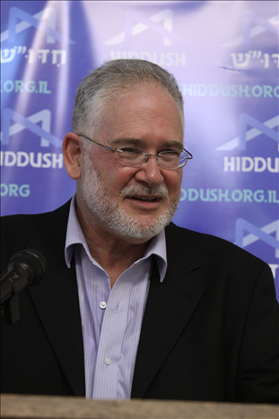Building bridges, not burning...
To Reach Diaspora, Make Israel Welcoming to All Jews
In a Jewish Daily Forward op-ed, Rabbi Uri Regev writes that Israeli and American Jewish leadership's blind eye to religious freedom in Israel will endanger Israel's relationship with the next generation of American Jewry.
24/09/2013 13:27
Tags: Prime Minister's Office · Jewish Agency · Pluralism · Diaspora Jewry · freedom of religion · freedom of marriage ·

CEO of Hiddush, Rabbi Uri Regev at the launch of Hiddush at the Hall of Independence in Tel Aviv. Limor Edery 14.09.09
I am always delighted by the Sukkot tradition of ushpizin. We invite guests, ceremonially and literally, into our homes to celebrate the spirit of Jewish hospitality — a central theme of this festival. This year, I challenge Israel and world Jewry to ask themselves a question: How big is our people’s sukkah?
This question came to mind following the latest initiative by the Israeli prime minister and the Jewish Agency for Israel to connect the next generation of North American Jewry to Israel. They are about to launch an unprecedented campaign, ambitious in scope and, with a reported price tag of $300 million a year, a significant commitment of resources.
These efforts may be for naught. The current Israeli government perpetuates the ultra-Orthodox monopoly over Judaism. As a result, more than half of that next generation — the children of intermarriages and non-Orthodox conversions — would not be deemed Jewish enough to marry in Israel. How can a stable and long-term relationship be established between Israel and the Diaspora when the Israeli government refuses to give those who will make up American Jewry’s future an equal place at the table? By rejecting Jewish pluralism, not only are Israeli politicians slapping the face of the predominantly Reform and Conservative North American Jewry, but they also perpetuate Israel’s embarrassing standing as the only democracy in the world to deny its citizens freedom of marriage.
The new initiative, which plans to increase Israel programming, travel and engagement dramatically, is undoubtedly praiseworthy. Israeli leadership must urgently forge a bond with the next generation of American Jews, for whom the collective memories of the Holocaust, the establishment of the State of Israel and the Six Day War have little or no meaning.
Already a decade ago, Israel’s National Security Council identified the bond between Diaspora communities and Israel as a strategic asset and priority. The massive investment in Birthright is a result of this realization. Minister of Diaspora Affairs Naftali Bennett recently sent a Rosh Hashanah greeting to the non-Orthodox movements, insisting that his ultimate objective is “to improve Israel’s ties with all Jewish communities in the Diaspora.”
If the prime minister and the Jewish Agency wish to engage all of American Jewry (and not just Orthodoxy), they must understand that the overwhelming majority of Jewish leadership and financial and political supporters of Israel are not Orthodox Jews.
These are all steps in the right direction, but if Israeli politicians and their partners in the Diaspora turn a blind eye to the blatant religious discrimination in Israel, these endeavors are all destined to fail. If the prime minister and the Jewish Agency wish to engage all of American Jewry (and not just Orthodoxy), they must understand that the overwhelming majority of Jewish leadership and financial and political supporters of Israel are not Orthodox Jews.
This obliviousness is typical of both Israeli politicians and North American Jewish leadership. To date, the Jewish Agency has not addressed the challenge of pluralism in Israel. It has ignored the inability of Russian olim and children of non-Orthodox converts and intermarriages to marry in Israel. In the past, grassroots pressure has resulted in damage control on such issues as “Who is a Jew” and now Women of the Wall, placing a loose bandage over a deep wound, without a tangible solution.
There have been several encouraging signs of change for American involvement in Israeli pluralism.Most recently, the AJC statement on religious freedom in Israel and the National Council of Jewish Women's, call for freedom of marriage in Israel testify to this positive trend. But we must continue to raise our voices together to garner more awareness!
American Jews cherish pluralism and would never tolerate coercive Jewish practice in their own communities. They have not yet understood that an overwhelming majority of Israelis share the same sentiment. The 2013 Religion and State Index, released by my organization, Hiddush – Freedom of Religion for Israel, on the eve of Rosh Hashanah, shows that 83% of Israeli Jews support freedom of religion and equality, 67% favor equal state recognition for Reform and Conservative rabbis, and 62% support recognition of non-Orthodox marriages. Similarly, two-thirds of secular Israelis would have non-Orthodox marriages if given the choice. Many Orthodox Israelis also share this pluralistic view. In "The Civil Framework for Marriage and Divorce in Israel," two Orthodox scholars identify breaking the Orthodox monopoly over marriage and divorce as a "social, moral, legal, religious, and cultural necessity." Israel's politicians still ignore the obvious public support for these freedoms. I do not expect the PMO-JAFI initiative will stray from that detrimental path.
Are the prime minister and the Jewish Agency truly committed to a relationship between Diaspora youth and Israelis? Sadly, this initiative and similar endeavors do not yet express a genuine commitment to Jewish peoplehood. Unless American Jewish leadership and Israeli pluralistic organizations work together to advance religious freedom as promised in Israel’s Declaration of Independence, the Israeli government’s sukkah will shrink continuously and the majority of the Jewish people will be left on the outside.
An edited version of this article appeared in the Jewish Daily Forward.